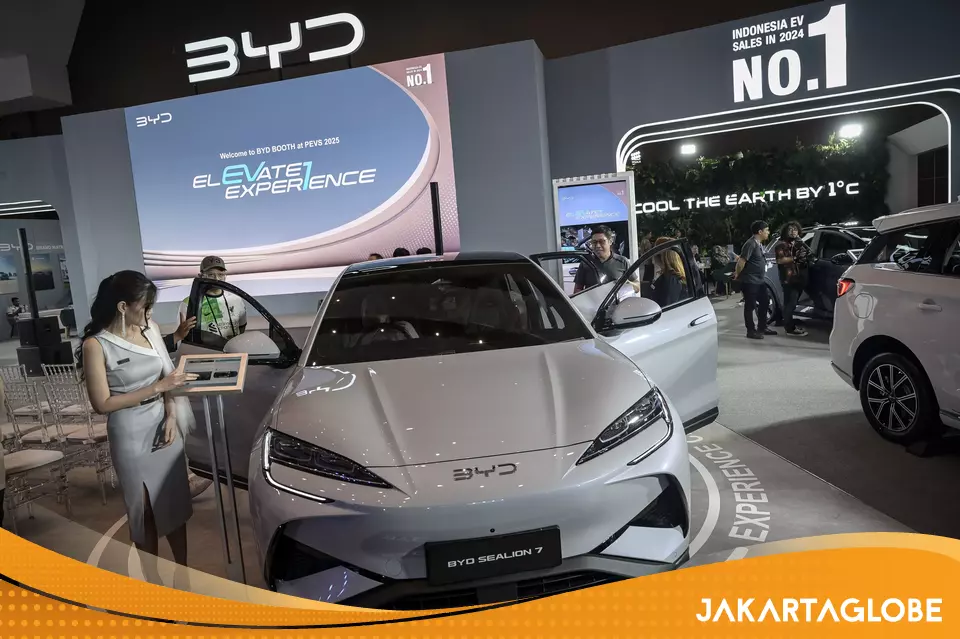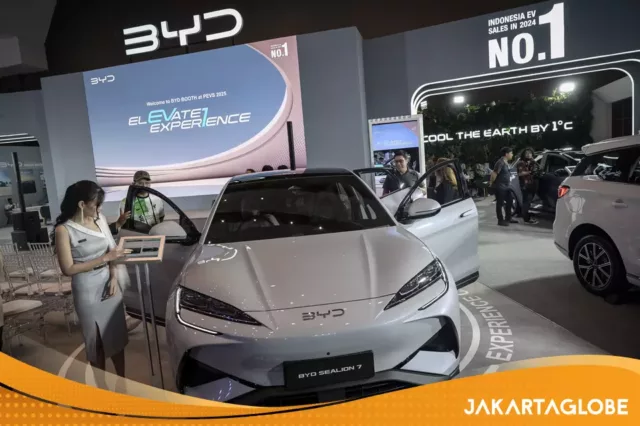
Jakarta. Chinese electric vehicle giant BYD has emerged as the top EV seller in Indonesia and the sixth biggest car brand overall, marking a rapid ascent in one of Southeast Asia’s most competitive auto markets.
In the EV segment — where Japanese automakers remain cautious — BYD led with 5,718 units sold in the first quarter of 2025, according to data from the Indonesian Automotive Industry Association (Gaikindo).
These figures exclude sales from Denza, BYD’s premium sub-brand, which sold 2,524 luxury electric MPVs, making it the second-largest EV brand in the country.
Other Chinese brands also dominated the top ranks: Chery (2,465 units), Wuling (2,177), and AION (1,201). In contrast, South Korea’s Hyundai, which manufactures locally and sells both EVs and conventional cars, sold only 573 EVs in the same period.
Advertisement
Overall Sales: BYD Closes in on Industry Heavyweights
In terms of total car wholesales (factory-to-dealer sales) from January to April 2025, BYD secured the sixth-largest market share in Indonesia — despite selling only EVs and having entered the market just one year ago.
BYD officially launched its Indonesian operations in January 2024 and began consumer deliveries in June 2024, importing vehicles from China under a government agreement that requires it to begin local assembly by 2026.
BYD recorded 9,214 units sold during the four-month period, claiming a 3.6 percent share, behind:
- Toyota (33.2%)
- Daihatsu (17.1%)
- Honda (9.9%)
- Mitsubishi (8.3%)
- Suzuki (7.1%)
When Denza sales are included, BYD’s market share increases to 4.9 percent, though its rank remains unchanged.
The data points to BYD’s strong upward trajectory. Monthly sales surged from 1,114 units in January to 3,496 in April. Meanwhile, Suzuki’s sales declined steadily over the same period, and Mitsubishi’s dropped to a year-low of 3,791 in April.
In April alone, BYD ranked fifth in overall monthly wholesales.
In retail sales (dealership to customer), BYD also placed sixth, with 8,894 units sold and a 3.3 percent market share.
Across all 45 brands tracked by Gaikindo, total wholesales for the January-April period reached 256,368 units, and retail sales stood at 267,514, down 2.9 percent and 7.7 percent year-on-year, respectively.
Japanese Automakers Double Down on Hybrids
While EV sales grow rapidly, Japanese automakers remain committed to hybrid technology as a more practical solution for the Indonesian market.
Astra International, the local distributor for Toyota, Daihatsu, and Isuzu, is holding off on a full EV rollout.
“Hybrid is the most realistic solution for Indonesian mobility,” said Henry Tanoto, Director at Astra. “We plan to introduce hybrid variants for our mass market segment soon.”
Astra currently offers 15 hybrid models, with Henry emphasizing the advantages of resale value and a well-established after-sales ecosystem.
“EV buyers still face challenges — access to charging infrastructure and concerns over resale value. Many still consider EVs a secondary vehicle,” he added.
Hybrid cars, by contrast, have seen broader adoption beyond major urban centers, including in satellite cities.
In Q1, Astra sold 110,812 vehicles across its brands, securing a dominant 54 percent market share.
(Indah Pudji Astuti contributed to this report)
Tags:
Keywords:







